Andre Vltchek

The indigenous people of Altiplano (Photo: Andre Vltchek 2019©)
[dropcap]B[/dropcap]olivia, December 2019, three weeks after the fascist coup. It is devilishly cold. My comrade’s car is carefully navigating through the deep mud tracks. Enormous snow-covered mountain peaks are clearly visible in the distance.
The Bolivian Altiplano; beloved, yet always somehow hostile, silent, impenetrable.
So many times, in the past I came close to death here. In Peru as well as in Bolivia. More often in Peru.
Now, what I do is totally mad. Being a supporter of President Evo Morales from the beginning until this very moment, I am not supposed to be here; in Bolivia, in the Altiplano. But I am, because these mud huts on the left and right, are so familiar and so dear to me.
My comrade is a Bolivian farmer, an indigenous man. His hands are red, rough. He usually does not talk much, but after the coup, he cannot stop speaking. This is his country; the country that he loves and which has been stolen from him, from his wife and from his children.
We can both get screwed here, but if we do, that’s life; we know the risk and we are happy to take it.
Carlos (not his real name), my driver and a friend, explained:
“I called them, the elders, and they said it is OK that you come. I sent them your essays. You know, people here now read, even in the deep villages. After 14 years of Evo’s government, the entire country is covered by the mobile phone network. They read your stuff translated into Spanish. They liked what they read. They agreed to give you a statement. But they said, ‘if he is not really a Russian-Chinese left-wing writer, but instead some Camacho crony, we will break his head with a stone.’”
Camacho; Luis Fernando Camacho, a member of the fascist, U.S.-backed Revolutionary Nationalist Movement, and the Chair of the Civic Committee of Santa Cruz since 2019. A major adversary of Evo Morales, a man who during the 2019 Bolivian general election, sided with the West, with the treasonous Bolivian military (trained in the United States), and demanded Evo’s resignation, on 5 November 2019.
I am fine with what they say. We are going.
We drive up, and then, at approximately 4,100 meters above sea level, we level up.
A new, wide road is being constructed. Of course, it is a project from the days of Evo’s presidency.
But it is not only the road building that can be detected all around us. There are water towers and water pumps and faucets in every village. Water is free, for all. There are schools, medical centers as well as sport facilities, and carefully attended fields.
The drive is long, tough. But at one point, we see a few buses and cars parked on the top of a hill.
There is a small plateau, and a giant white speaker sitting in the middle of the field.
People in colorful outfits are scattered all around the site: men, women and children. A group of elders is seated in a closed circle. They are chanting, and their appeal is broadcasted through the speaker. They are addressing what is sacred to them: Mother Earth. They need strength in order to go on, to struggle, to defend themselves.
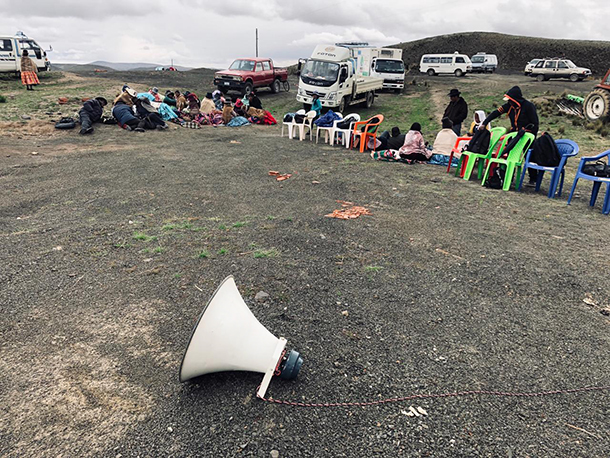
Deeply Rooted: Indigenous people in Altiplano gather to speak with Mother Earth (Photo: Andre Vltchek 2019©)
I am first ‘scanned’ by the people, and only then allowed to approach the elders. I explain who I am, and soon, the formalities are over.
“Please record but do not film our faces, for security,” I am told. “But later, you can film the gathering.”
Soon after, I sit down, and they begin to talk:
“The situation which we are living in these days in our country, in the communities up here, in the Andean communities is very difficult. In reality we feel frustrated, often abandoned because during the previous government led by President Evo Morales, we as farmers and indigenous people, felt very good. Even if, sometimes, we did not receive too much help, still, the government, the very President Evo Morales, is of our own blood, our own class. For that reason, we were supporting him. And we keep supporting him.”
“And this, what we have, now is a government – dictatorship. They say the contrary, but it is a fascist government. It is a government which is burning Wiphala, our symbol. It dishonors us. We feel humiliated, we feel discriminated against. For that reason, we realize that we cannot fail; we cannot stay here like this, we will continue fighting. There will be elections in our country, and we will continue supporting that one person who has elevated our name; the name of the native people, of workers, of working people, and of the poor.”
“First, we will go to the elections, if of course there are elections. We will go and support our people; our leaders. In case that they will produce electoral fraud, then yes, we will rise!”

Indigenous elders gather to discuss the current state of affairs in their country (Photo: Andre Vltchek 2019©)

Evo’s legacy: super modern mobile dental clinic providing health services to the people (Photo: Andre Vltchek 2019©)
I told them that I have known their country, and Altiplano, for more than 25 years. Everything has changed. The villages consisting of mud huts came to life. They woke up, began to bloom.
Water for all began to run through the pipes provided by the government. Modern ambulances have been deployed, serving all corners of the nation. Health centers opened their doors to millions of students, and so did schools, and vocation centers. New roads have been built. The government encouraged ecological farming.
Bolivia, for decades and centuries living under monstrous apartheid has been exploited, humiliated and robbed of everything, but lately has begun rising to its feet.
I told them this. I told them how I used to come here, again and again, in the 1990’s, from Peru; a country devastated by the so-called “Dirty War” which I have described in my novel “Point of No Return”. Peru was terribly broken, but here, in Bolivia, people were half-alive. There was no hope, only silent, frightening misery.
Now Bolivia, once the poorest country in South America, has been way ahead of Peru, a state which has been relentlessly cannibalized by the neo-liberal economic model, while still racially and socially divided to the extreme.
I asked the elders, whether they agreed. They did.
“Certainly. Because with our own eyes we have seen enormous economic changes and we have witnessed how Bolivia rose and after those 14 years, got ahead of this entire Latin American region.”
I filmed, photographed.
Before we left, an elderly woman approached the car, and screamed something in a local language.
Carlos translated:
“We will all fight those evil beings who declared themselves our rulers. If they don’t disappear, soon again we will close the roads between El Alto and La Paz, and they will have to eat their own excrement. Our people will never again be defeated. Say this wherever you go!”
I said that I will.
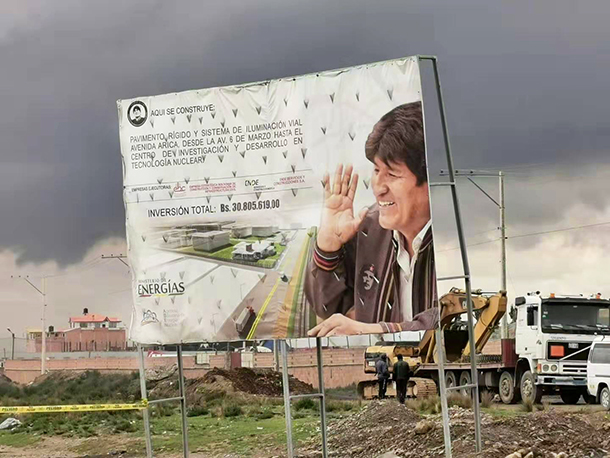
Real transparency: Bolivia’s president publishes his government’s financial account on billboards (Photo: Andre Vltchek 2019©)
In 1971, the great Uruguayan writer, journalist and poet, Eduardo Galeano, published his book Open Veins of Latin America, which soon became the most important tome for the Latin American left-wing thinkers and revolutionaries.
Inside the book, which was regularly banned all over the continent, Galeano had written about those 500 years of monstrous plunder, deceit and cruelty, committed by the Europeans and the North Americans against the people of South and Central America. Some of the most terrible crimes were committed on the territory which is now Bolivia, particularly in the silver mines of the city of Potosi, which helped to make Europe rich, but whose tens of thousands of people died, while forced to live and work as slaves.
Not long before he passed away, I worked with Eduardo Galeano in his café, in the old city of Montevideo.
It was during the heady days of the “Pink Revolutions” wave. We were celebrating our victories, sharing hope for the future.
But at one point, Eduardo paused, and said, simply:
“You know, all of our comrades who are holding power now have to be very careful. They have to understand that the poor people who voted them in, or who supported them when they were taking power, have only one thing left in their life, and that is hope. You take away their hope, and they are left with nothing. Robbing them of hope is like killing them. That is why, whenever I encounter our left-wing leaders, and I do it very often, I always tell them: ‘Comrades, careful, Do not play with hope! Never promise to people what you cannot deliver. Always keep your word.”
Juan Evo Morales Ayma, the first Bolivian indigenous president, understood Galeano and his work perfectly well. He and his Movement for Socialism (MAS), never betrayed the trust of the poor people. That is why he was never forgiven by the West, and by many individuals coming from the treasonous Bolivian elites and the military.
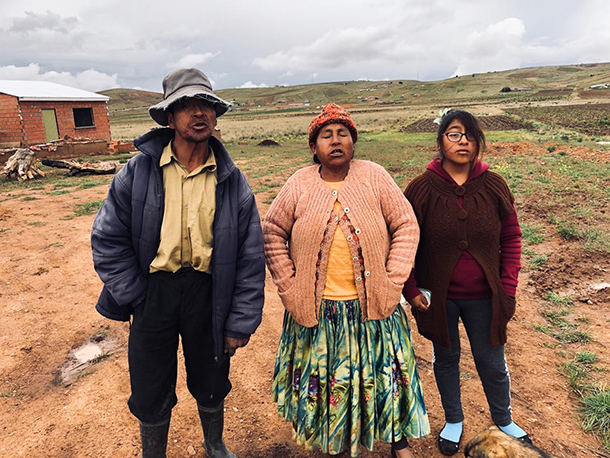
Farming family in Altiplano continue struggling amid harsh conditions (Photo: Andre Vltchek 2019©)

Majestic Mt. Illimani
After my meeting with the indigenous leaders, I asked Carlos to drive us around Altiplano, without any particular plan. I wanted to talk to people; to the poorest of the poor of Bolivia.
At one point, we arrived at a tiny hamlet. A dog with a broken leg welcomed us with loud but innocuous barking. There were two sheep near the entrance to the house. An elderly farmer, his blind wife and a daughter were working in the field.
They were not afraid to speak, even to be recorded and photographed, as long as I promised not to reveal their names.
The farmer had half of his teeth missing, and he was leaning to one side, but his thoughts and words were clear:
“Thanks to Evo for everything. There is his work, and it speaks for itself; that road, infrastructure. Even this little house that we have is because of him.”
“Here we don’t want that so-called President Añez. She wants to mislead us, she lies to us. We are with MAS; all of us up here are strongly supporting MAS. We are supporting our brother Evo. We have always been suffering here, but Evo came with excellent projects… but now all progress will stop.”
The daughter is perhaps 14 years old. She is a product of Evo’s government. Neatly dressed, with nice glasses, she speaks fluently. Her words are well formulated:
“Those coup leaders have no pity on us. They have been shooting at us, beating us, gassing us. They have been violating our women. Lately, our mothers, our fathers suffered tremendously in La Paz. People were injured, people died, and the military and the coup leaders have no mercy. We don’t want to be slaves, like before. After the coup, the new government said terrible things about our president; things that we don’t like at all. We don’t want to be slaves, nor to be dammed by that new lady-president and by her people. She is a racist. The truth is that she is too racist. They call us ‘Indios’, and say things about us that make us furious. They are discriminating against us in all possible ways.”
“But you don’t lose hope?” I asked.
“I don’t,” she smiled. “I am with MAS. And MAS is going to be victorious. We will defeat those who are behind the coup.”
We left, heading towards the main road.
“One more stop,” I asked Carlos.
We drove, randomly, towards a partially damaged dwelling.
“What happened here?” I asked.
The family members spoke over each other:
“In November, Camacho sent here several buses full of his supporters, from Potosi. They arrived, and began beating us up, insulting us, killing our animals and destroying our houses. They forced us to our knees, tying our hands behind our backs. They called us the most insulting names. They humiliated us. They said that it is over, that now we will know again where we belong.”
I asked Carlos whether he had heard these stories before. He replied, without thinking:
“Of course. You can ask anyone up here, and they will confirm what you just heard.”
Before descending to La Paz, in El Alto, I asked Carlos to stop at several places, where in November, dozens of people died, blocking the capital as the protest against the coup, and against forcing Evo Morales into exile.

Bullet holes are marked in front indigenous woman and her daughter waiting to cross the road in El Alto (Photo: Andre Vltchek 2019©)
The bullet holes that damaged the walls were still visible, and they were clearly marked. There were flowers there, where people had fallen. Soon, hopefully very soon, there will be monuments.
The graffiti all over El Alto, spoke clearly and loudly:
“Añez, we will finish you off – you coup-maker!”, “Añez – dictator!” and “Añez – killer!”
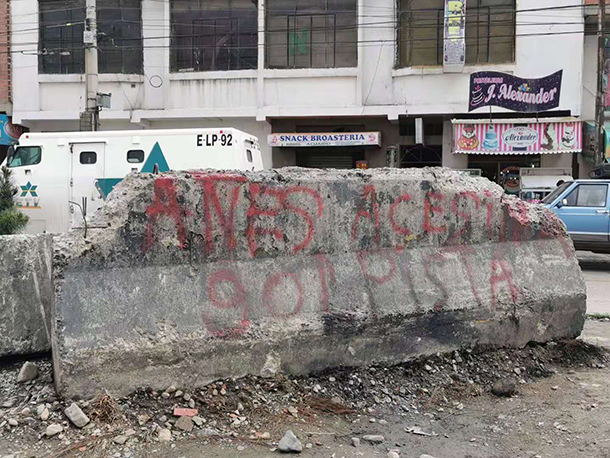
Unpopular US-backed puppet: Anti-Añez graffiti can be seen in cities and towns (Photo: Andre Vltchek 2019©)
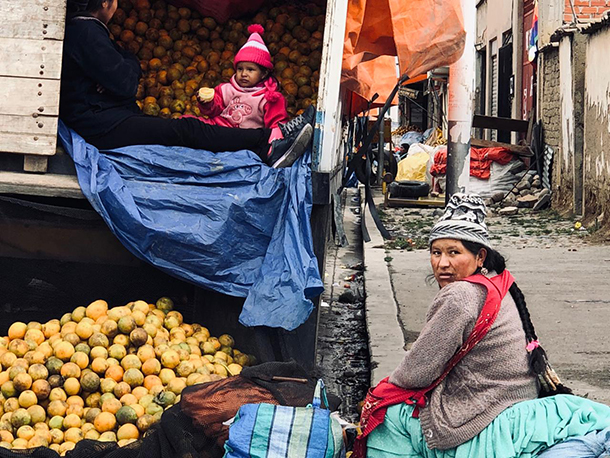
Fruit sellers in La Paz (Photo: Andre Vltchek 2019©)
Just half a year ago, I witnessed great fiestas in El Alto. I filmed colorful processions, people dancing, fireworks. I admired the new public spaces, super-modern cable cars, public swimming pools as well as the playgrounds constructed for children.
Now, the city felt like a cemetery. It was eerie, silent, gloomy.
The enormous Mount Illimani, the symbol of this ancient land, was covered by snow. It was beautiful now, but it is always stunning, in good times as well as during the disasters. La Paz, sitting in a tremendous crater, was clearly visible from above.
Holy Mount Illimani observing, and waiting (Photo: Andre Vltchek 2019©)
“The Yankees coming,” said Carlos. “You know, Añez has restored full diplomatic ties with Washington. And their spies and agents are flooding the embassy; all in civilian clothes, of course…”
“With their backs covered by the treasonous Bolivian military,” I uttered, sarcastically.
Carlos was quiet for some time. Then he decided to speak:
“When I was young, I was in the military myself. In Cochabamba, you know, during the water crises, and popular rebellion aimed at making water free. I never told you. Those were tough times. People stood up, and some died. Our unit consisted of mainly indigenous soldiers. The officers were white; almost all were. At one point, we let them know that we would not fire at our brothers and sisters. They shat their pants: captains, colonels; you should have seen them: they were running around, in barracks and outside, with no marks of their ranks. You know, at one point, if they were to have forced us to slaughter our people, we would have refused, and slaughtered them, instead.”
“They were trained in the West?” I asked.
“Many, yes.”
“And now Carlos? What about now?”
He began whispering, although no one seemed to be around:
“I have two relatives in the army. I talked to one of them, a few days ago. It is the same as when I was serving in Cochabamba. The upper ranks are with the Yanquis, but the troops, most of them, are with MAS; they are with Evo. You see, if there is a mutiny, and there very well may be one, soon, then Añez, Camacho and their gringo friends will all soon be fucked!”
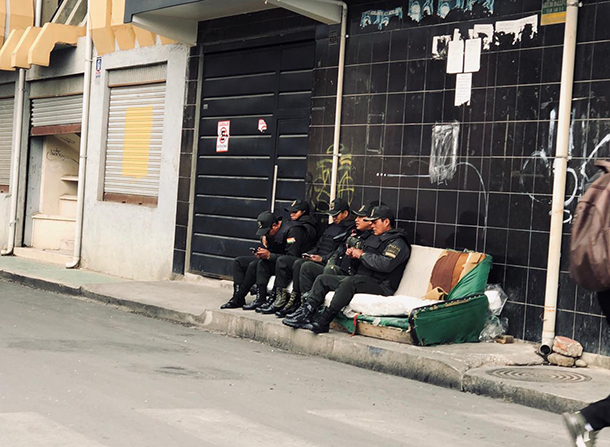
Police are stationed everywhere, at the ready, but still very uneasy (Photo: Andre Vltchek 2019©)
I went to the luxury hotel Suites Camino Real in La Paz, for lunch. I had to see “them”, the other side. Those who import exquisite beef from Santa Cruz province, those who consume it here, those who are now celebrating.
And celebrating they were.
Several parties were taking place, simultaneously. People were jumping around, hugging each other, shouting like mad. All white, all “tall and beautiful”, all blonde, peroxide or real. Wine was flowing.
Most of the waiters were indigenous, dressed in Western clothes; hushed and uncertain.
I met a former top economist in Evo’s government, Ernesto Yañez, who at one point served as the vice-President of the Central Bank of Bolivia. It was safe to meet here. We found a quite corner where we could talk:
“I certainly call what happened here, a coup. There was no election fraud.”
“Without any doubt, Evo’s years in power were marked by great economic stability. Especially in the beginning, there were almost no economic problems. The poverty rate decreased from 55% to below 30%. Quality of life increased dramatically.”
“In relatively poor Bolivia, poverty rates are lower than in the richest country on the continent, Argentina, after the reign of the neo-liberal President Macri”, I could not help but mention.
“Yes, but after the coup, the economy here is collapsing,” Ernesto said.
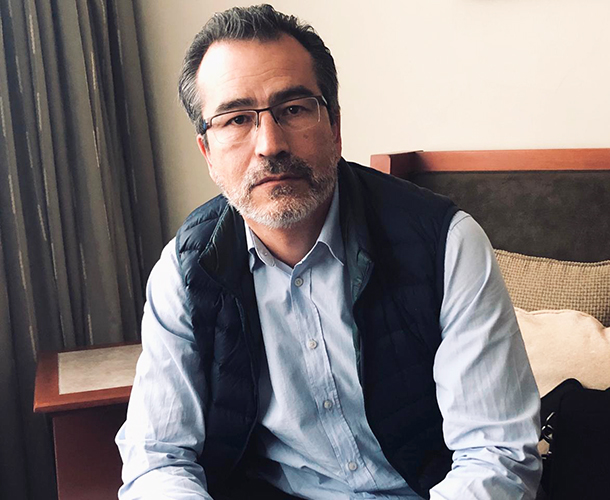
Former economist in the Morales government, Ernesto Yañez (Photo: Andre Vltchek 2019©)
Half a year ago, I was here, and there were violent strikes by doctors all over Bolivia. Many of them were educated for free, by the state, but after that, they were demanding a neo-liberal medical system, in which doctors and nurses would gain unrealistically high salaries. Many Cuban doctors have been deployed by the government, all over the country, in order to improve medical care.
Ernesto Yañez further clarified:
“During Evo’s government, millions of people moved from lower to middle class. Most of them were young. Which means, before the coup, and after 14 years of MAS rule, many young middle-class people had no idea what it is to live in misery. They took all the achievements of Evo and MAS for granted. Then, when certain hardships arrived, including the slowing down of the economy after 2014, they saw them as the failures of Evo’s government.”
“You know, for instance the doctors that you mentioned; they thought that if they brought down MAS, all their requests would be immediately fulfilled by the right-wing government. It never happened. Now they have no idea what to do.”
“The same as in Santa Cruz,” I agreed with him. “Fuel and utility prices are going up. Now the right-wingers will realize what it is to have their dream come true – a neo-liberal regime. They are getting wiped-out; desperate.”
Ernesto Yañez concluded:
“You, know, Evo made many Bolivian businessmen rich, too. The country and its economy were very stable, for years. Before he came to power, the big players were North Americans, Europeans and Chileans. During his mandate, Bolivian companies were given priority. Bolivian elites were always racist, for them, Evo was ‘un Indio mas’ (just another Indian). But they hid their feelings well. It is because Evo did things well. He changed this country for the better, almost for everybody.”
“But now, things have gone from bad to worse. The new president comes with the bible and cross, burns Wiphala, and people die. Now the Indigenous people want Evo back.”
And not only indigenous people, although almost all indigenous people who I met this time in Bolivia, do.
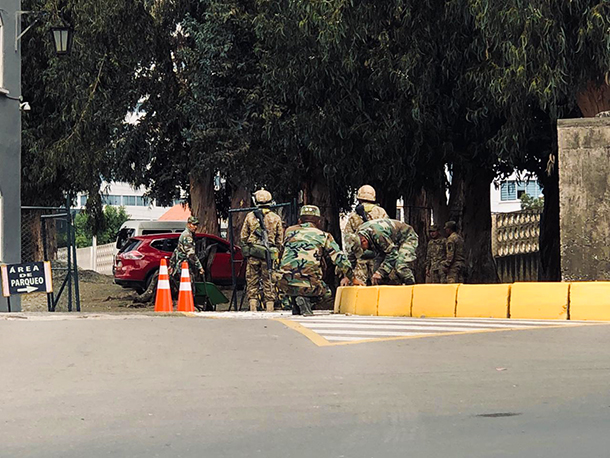
State of Emergency: Army still controlling roads in La Paz (Photo: Andre Vltchek 2019©)
I walked to Plaza Murillo in La Paz, where the Presidential Palace and the National Congress of Bolivia are located.
The police and military were everywhere. During Evo’s government, this was a quiet, open space, full of green trees, children and pigeons.
In front of the National Congress, several ladies dressed in beautiful indigenous clothes, were gathering, talking to each other. These were deputies from MAS.
I pulled out my cameras and approached them. Immediately, security dudes in plainclothes began approaching me, but the two lady-deputies made protective gestures with their arms, smiled at me, and rebuffed the security officers: “Leave him alone, he is with us.”
I knew we had no time, and I asked only one thing: “Are we standing, comrades?”
They did not hesitate:
“We are standing. They will not defeat us. MAS is the legitimate government of Bolivia.”
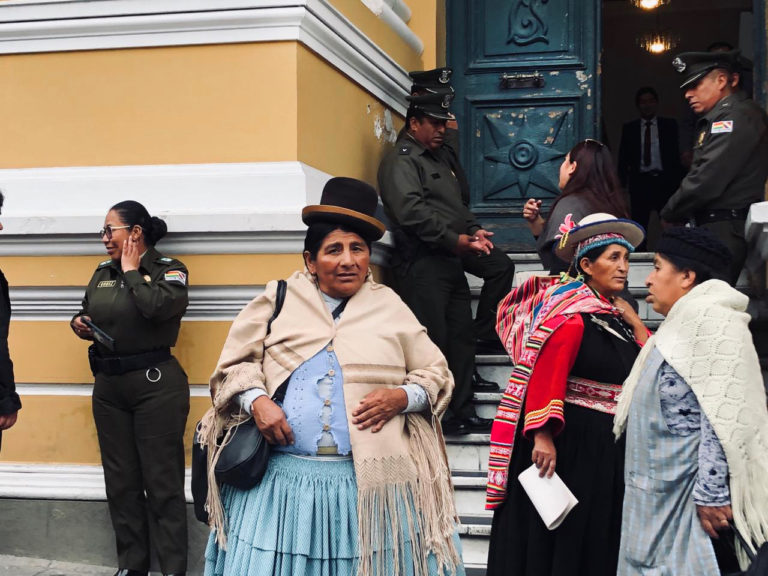
MAS women MPs in La Paz (Photo: Andre Vltchek 2019©)
And so, this is what I am reporting from the Plurinational Republic of Bolivia:
The country is under attack from the United States and its allies. It has been injured by its treasonous cadres, both military and civilian. Blood has been spilled. The legitimate president and vice-president are in exile. According to Reuters, “Bolivian minister seeks Israel help in fighting alleged leftist ‘terrorism.” Meaning, the legitimate government.
But the country is standing. People are not on their knees. First there will be a vote, but if there are any tricks from Washington or from the Organization of American States (OAS), there will be a fight.
Evo Morales and MAS won the recent elections. There is absolutely no way that MAS will not win again. I spoke to people, and now, even more than before, they are closing ranks around the Movement towards Socialism which made Bolivia one of the greatest nations in the Western Hemisphere.
The indigenous people of Bolivia and the rest of South America are not beggars or slaves. Long before the arrival of those brutal religious fundamentalists and badly brought-up looters – the Spanish conquerors – they were the owners of this beautiful land. Their civilization was much greater than that of their tormentors.
Evo’s government did much more than just improving the social situation in his country. He began reversing 500 years of cruel injustice on this continent. He gave power to the powerless. He returned pride to the people who had been robbed of everything.
Washington shows clearly where it stands. Despite its hypocritical “political correctness”, it is on the side of racism, colonialism and fascist oppression. Instead of defending freedom, it oppresses freedom. Instead of promoting democracy (which is “rule of the people”), it is raping democracy: here in Bolivia, and elsewhere.
Until Bolivia is free again, the entire freedom-loving world should be waving the Wiphala.

The Wiphala flag can still be seen flying on some buildings (Photo: Andre Vltchek 2019©)
The elders from the Altiplano sent a clear message to the world. Elections will take place, but if the people are robbed of their government, there will be an uprising and an epic battle.
Sadly, if there is a battle, some people will join the Earth. But also, the Earth will not stay idle – it will join her People.
Añez together with her colonialist symbols, is already being cursed by the majority of Bolivian people, and so are Camacho and several other traitors. But perhaps, technically, they are not “traitors”, after all. Their allegiances are to those nations which had attacked and have been looting this part of the world, for several long centuries.
After 500 years of being tormented and humiliated, the mother Earth, Pachamama, is embracing her children. Evo and MAS brought them together. This is a tremendous moment in history. People here realize it. European, racist elites realize it. Washington is well aware of it.
Right now, there is a moment of silence; a brief one.
If the fascist coup leaders do not back up, there will be huge thunder, and the people of Altiplano will rise, Wiphala in hand, supported by their ancient, sacred Earth.
***
![]() The big social media —Google, Facebook, Instagram, Twitter—are trying to silence us.
The big social media —Google, Facebook, Instagram, Twitter—are trying to silence us.






























